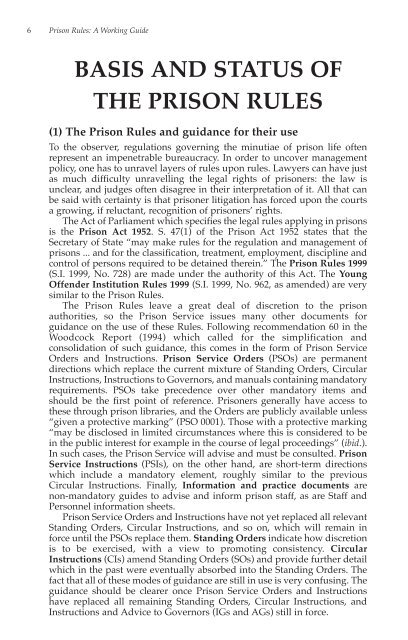Prison Rules: A Working Guide, The Millenium Edition
Prison Rules: A Working Guide, The Millenium Edition
Prison Rules: A Working Guide, The Millenium Edition
- No tags were found...
Create successful ePaper yourself
Turn your PDF publications into a flip-book with our unique Google optimized e-Paper software.
6 <strong>Prison</strong> <strong>Rules</strong>: A <strong>Working</strong> <strong>Guide</strong>BASIS AND STATUS OFTHE PRISON RULES(1) <strong>The</strong> <strong>Prison</strong> <strong>Rules</strong> and guidance for their useTo the observer, regulations governing the minutiae of prison life oftenrepresent an impenetrable bureaucracy. In order to uncover managementpolicy, one has to unravel layers of rules upon rules. Lawyers can have justas much difficulty unravelling the legal rights of prisoners: the law isunclear, and judges often disagree in their interpretation of it. All that canbe said with certainty is that prisoner litigation has forced upon the courtsa growing, if reluctant, recognition of prisoners’ rights.<strong>The</strong> Act of Parliament which specifies the legal rules applying in prisonsis the <strong>Prison</strong> Act 1952. S. 47(1) of the <strong>Prison</strong> Act 1952 states that theSecretary of State “may make rules for the regulation and management ofprisons ... and for the classification, treatment, employment, discipline andcontrol of persons required to be detained therein.” <strong>The</strong> <strong>Prison</strong> <strong>Rules</strong> 1999(S.I. 1999, No. 728) are made under the authority of this Act. <strong>The</strong> YoungOffender Institution <strong>Rules</strong> 1999 (S.I. 1999, No. 962, as amended) are verysimilar to the <strong>Prison</strong> <strong>Rules</strong>.<strong>The</strong> <strong>Prison</strong> <strong>Rules</strong> leave a great deal of discretion to the prisonauthorities, so the <strong>Prison</strong> Service issues many other documents forguidance on the use of these <strong>Rules</strong>. Following recommendation 60 in theWoodcock Report (1994) which called for the simplification andconsolidation of such guidance, this comes in the form of <strong>Prison</strong> ServiceOrders and Instructions. <strong>Prison</strong> Service Orders (PSOs) are permanentdirections which replace the current mixture of Standing Orders, CircularInstructions, Instructions to Governors, and manuals containing mandatoryrequirements. PSOs take precedence over other mandatory items andshould be the first point of reference. <strong>Prison</strong>ers generally have access tothese through prison libraries, and the Orders are publicly available unless“given a protective marking” (PSO 0001). Those with a protective marking“may be disclosed in limited circumstances where this is considered to bein the public interest for example in the course of legal proceedings” (ibid.).In such cases, the <strong>Prison</strong> Service will advise and must be consulted. <strong>Prison</strong>Service Instructions (PSIs), on the other hand, are short-term directionswhich include a mandatory element, roughly similar to the previousCircular Instructions. Finally, Information and practice documents arenon-mandatory guides to advise and inform prison staff, as are Staff andPersonnel information sheets.<strong>Prison</strong> Service Orders and Instructions have not yet replaced all relevantStanding Orders, Circular Instructions, and so on, which will remain inforce until the PSOs replace them. Standing Orders indicate how discretionis to be exercised, with a view to promoting consistency. CircularInstructions (CIs) amend Standing Orders (SOs) and provide further detailwhich in the past were eventually absorbed into the Standing Orders. <strong>The</strong>fact that all of these modes of guidance are still in use is very confusing. <strong>The</strong>guidance should be clearer once <strong>Prison</strong> Service Orders and Instructionshave replaced all remaining Standing Orders, Circular Instructions, andInstructions and Advice to Governors (IGs and AGs) still in force.
















